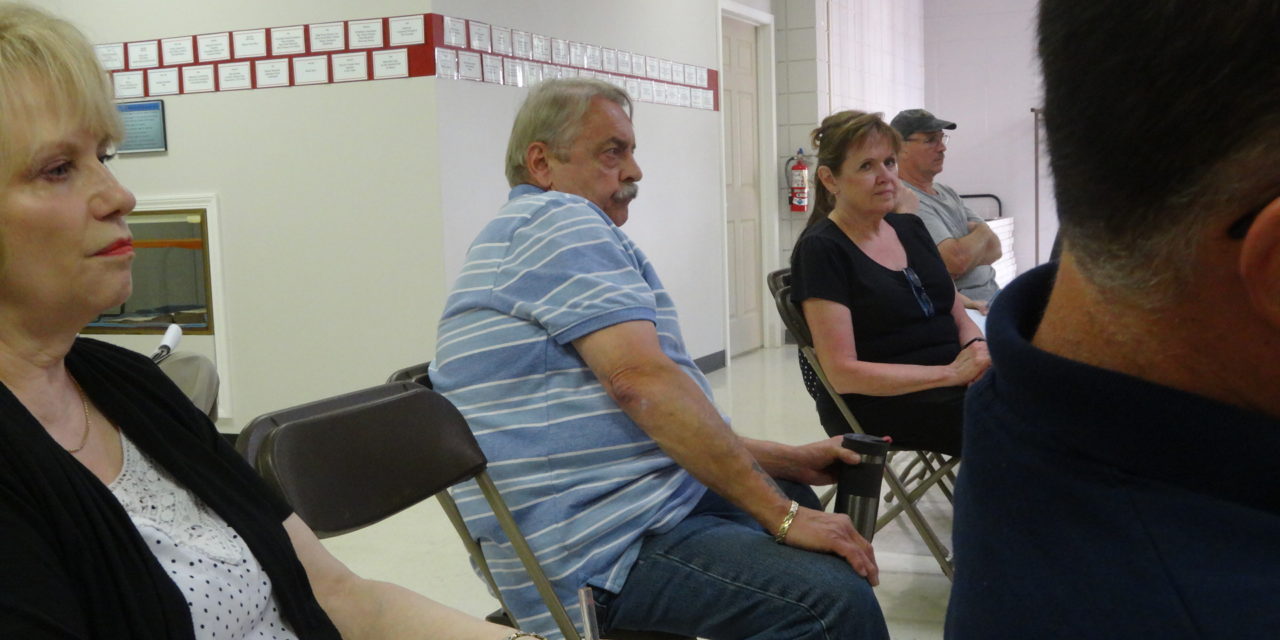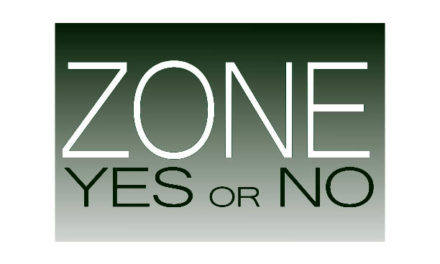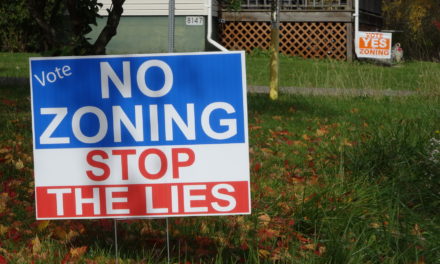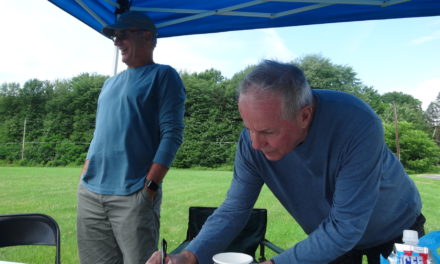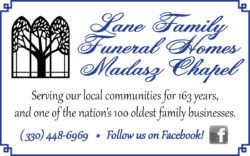Editor’s notes: This is the first of a series of web-only stories on subjects discussed at the June 19 public hearing of the Brookfield Township Zoning Commission.
John T. Chewning entered the June 19 public hearing of the Brookfield Township Zoning Commission in favor of zoning but with reservations about how officials are going about proposing it.
Jason Nicholson entered the meeting against zoning and walked out without changing his opinion.
The men shared similar concerns about how the township’s Exterior Property Maintenance Code is being enforced, but with different opinions on zoning.
The same, but different – or should it be?
In what has become a dogged debate about code enforcement versus zoning, zoning Commission ChairmanTodd Fencyk tried to explain the difference.
“There are similarities, yes, I agree,” he said. ”They’re also vastly different.”
The Exterior Property Maintenance Code, which has been in place for 10 years, “has to do primarily with the exterior maintenance of buildings and the grounds,” such as “how high your grass is, if you have, maybe, your roof is falling in,” Fencyk said.
“Zoning has to do with land usage,” he said, such as where you can build a home or a business.
“There would be a couple things that crossed over,” Fencyk said. “Such as if you would have a junkyard in a residential area, wanted to put one in. Residential (zoning provisions) would say no, you can’t put a junkyard in a residential area, and the same as a commercial business, you couldn’t put that in a residential area.”
But, Chewning said the separation is not clear enough.
“You’re talking land usage (in zoning), but the code enforcement is also looking at land usage, too,” he said.
The township needs to rescind the Exterior Property Maintenance Code and incorporate some of its provisions into the zoning resolution, Chewning said.
“Right now, they look and almost mirror each other,” he said of the preambles to each document. “If we are not doing code enforcement properly and efficiently and the way it’s to be done, then we are setting ourself up for failure.”
He said he wasn’t just talking about failure at the voting booth but, if zoning would be approved, in its implementation afterward, “especially, if you have the same officer involved.”
Trustee Ron Haun said it is the board of trustees’ intention to name Code Enforcement Officer Jimmy Ewing the zoning officer, if zoning is approved, but Ewing’s hours and pay would not change.
Gil Blair, the township’s attorney and a Weathersfield Township trustee, said “code enforcement is something you have in the absence of zoning.”
A zoning ordinance has more enforcement “teeth” than a property maintenance code, Blair said.
“A zoning ordinance would strengthen your ability to do code enforcement,” Blair said.
Chewning recommended the trustees slow the zoning resolution approval process and not push for a November ballot referendum in order to review the code enforcement effort.
The ‘bigger stuff’
Nicholson brought a long list of concerns to the meeting, from whether he’ll be able to burn – the commission members said zoning won’t regulate burning – to the politics inherent in having a zoning commission and appeals board that will decide whether variances are granted and changes are recommended.
But, he also agreed with Chewning that the Exterior Property Maintenance Code has not been uniformly enforced.
“We got a business, the old BP gas station up there, it used to be Fireball Motors, it’s trashed,” he said of the property on the northeast corner of Warren Sharon Road and Route 7.
There has been no effort by the township to clean up that property, he said.
Yet, the trustees have fielded complaints, and passed them on to the Ohio Environmental Protection Agency, concerning the Wilson’s Landscaping property on Broadway Avenue.
“You’re going to go after a residential guy that’s storing cars when you got that (ex-BP property) in your downtown? Come on. Take care of the bigger stuff,” Nicholson said.
The bigger stuff for Nicholson in terms of zoning is what he sees as a lack of transparency. The notice provisions in the zoning resolution are weak, he said.
The resolution states how notice will be given when someone requests a variance or appeals a decision by a zoning inspector, or the township proposes an amendment to the ordinance, including the advertisement of public hearings in at least one general-circulation newspaper.
The state Sunshine Law and Ohio Revised Code also would come into play as far as providing notice, said Gil Blair, township attorney and a Weathersfield Township trustee.
That wasn’t good enough for Nicholson.
“It doesn’t say that in here,” he said of the zoning resolution. “That’s the thing – it has to say it.”
“It doesn’t say in here, also, that we had to have this meeting, but that’s just part of the procedure,” said Fencyk. “We have to follow the procedures as set up by the Ohio Revised Code and that involves putting a legal notice in the paper there’s going to be changes.”
Nicholson said after the meeting that he did not learn about the public hearing through a newspaper, and probably would not see future notices posted there.
Resident Henry Tasker asked how notice was given for the hearing, to which committee members replied it was printed in three newspapers – two by paid ads – announced at a trustees meeting and posted on social media.
Tasker replied he was surprised it was not posted on the message board at the north end of the green in Brookfield Center, across the street from the former BP station Nicholson had complained about.
After discussion about how many days a notice can be listed on the board, Fencyk said the commission was not required to place a notice there.
“If you’re not required, you’re not going to do it?” Nicholson asked, to which Fencyk replied: “I did not say that.”
“We can look into it for next time,” committee member Shannon Hanley said.
Can common ground be found?
Although the committee did not convince Nicholson to switch sides, members thanked him for bringing up his concerns.
“It’s good to know the points that you (Nicholson) brought up,” said commission member Tori Lucy. “You’re a fantastic resource for us, because those are questions you have on it and we don’t know those questions until someone presents them to us. It’s good for us, because you tell us what you don’t know and want to know about it, how it’s going to affect you. Let us do that homework for you. Let us dig in to see.”
Chewning and resident Bill Brown recommended the commission reach out to those opposed to zoning and see if there isn’t common ground or ways to change the resolution to take into account what zoning opponents object to.
If the committee does that and zoning opponents don’t agree to meet, that gives a strategic advantage to the commission, Chewning said.
“Now, from a PR point of view, you can go out there and say, ‘Hey, you know. We offered the no people to have input.’”
Photo shows John T. Chewning in blue shirt.

